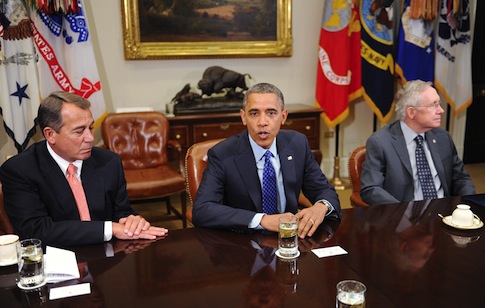Lawmakers kicked off negotiations over the so-called fiscal cliff at the White House on Friday with both sides expressing optimism that a deal could be reached before the end of the year.
Republicans in Congress say they understand their political leverage is diminished after the election and are largely resigned to a compromise that would force wealthy families and small businesses to pay more in taxes.
However, GOP leaders have insisted that any new revenue come from closing tax loopholes and other special interest deductions for the wealthy as opposed to raising tax rates which they said would undermine economic growth.
Republicans are hopeful that negotiations can secure at least a framework for comprehensive tax reform that ultimately lowers rates while raising revenue by broadening the overall tax base.
"There are ways to put revenue on the table without increasing tax rates," House Speaker John Boehner (R., Ohio) said Friday. "We've talked about this now for over a year."
Boehner had previously dismissed the notion that Barack Obama’s reelection gave him a "mandate for raising tax rates" citing his party’s successful effort to maintain its House majority.
Republicans were pleased to see President Obama decline an opportunity last week to draw a "red line" on higher tax rates.
"I’m less concerned about red lines per se," Obama told reporters during his first solo full-scale news conference at the White House since March. "What I’m concerned about is not finding ourselves in a situation where the wealthy aren’t paying more or aren’t paying as much as they should."
However, the White House is asking for $1.6 trillion in new taxes over the next decade. That figure is roughly twice the amount discussed in previous deficit talks with Republican leaders.
GOP leaders remain adamant that such an agreement also includes spending cuts and meaningful changes to entitlement programs such as Medicare that are the primary drivers of the national debt and are rapidly approaching insolvency.
The president and other top Democrats have expressed a willingness to consider such reforms. Republicans are optimistic that a favorable outcome can be achieved on entitlements due to both economic reality and the threat of another credit downgrade.
When Congress returns from the Thanksgiving recess next week, party leaders will have about five weeks to negotiate a deal to avoid going over the "fiscal cliff," the term used to describe more than $600 billion in automatic spending cuts and tax increases scheduled to occur on Jan. 1, 2013.
Leaders on both sides of the aisle have publicly expressed a desire to prevent the automatic cuts and tax increases which the Congressional Budget Office has warned could trigger another economic recession.
Senate Majority Leader Harry Reid (D., Nev.) said Friday that the deal should come sooner rather than later.
"This isn't something we're going to wait until the last day of December to get it done. We have a plan. We're going to move forward on it," he told reporters outside the White House.
However, some Republicans suspect President Obama and Democrats might be willing to risk such a scenario in order to press for larger tax increases.
"For Democrats there seems to be very little incentive for them to avoid that scenario," Sen. John Thune (R., S.D.) said. "I just don’t think Democrats believe that raising taxes is going to harm the economy. For them it’s about: ‘get more revenue so we can spend more.’"
Leading Democrats in the Senate have suggested that a fiscal cliff agreement should include new spending to stimulate the economy.
Republicans believe their primary focus heading into the negotiations should be holding firmly against tax rate increases which they believe would harm the still-fragile economy.
"It’s possible that any new revenue we get from tax increases could be negated by reduced economic growth," Thune said. "We want to avoid that."
House Republicans appear unlikely to support an increase in tax rates at the moment as GOP leadership will have a hard enough time convincing members to accept a revenue increase of any kind.
GOP resistance is centered around the stagnant economy which is currently growing at a slower rate than it was two years ago when Obama agreed to extend all Bush-era tax rates and argued that raising taxes would undermine the economic recovery.
However, Obama said last week that raising taxes now was acceptable because the economy had sufficiently recovered.
Some consider the possibility of gaining a permanent extension of Bush-era tax rates on incomes below the $250,000 threshold a victory in the long run even if Republicans are forced to make concessions on new revenue through loophole closures.
It would, for example, establish a permanent baseline that could complicate future Democratic efforts to raise taxes.
Republicans for the time being are simply hoping to salvage the best possible deal in the wake of an electoral drubbing that few thought possible after the party’s stunning victory in 2010.
